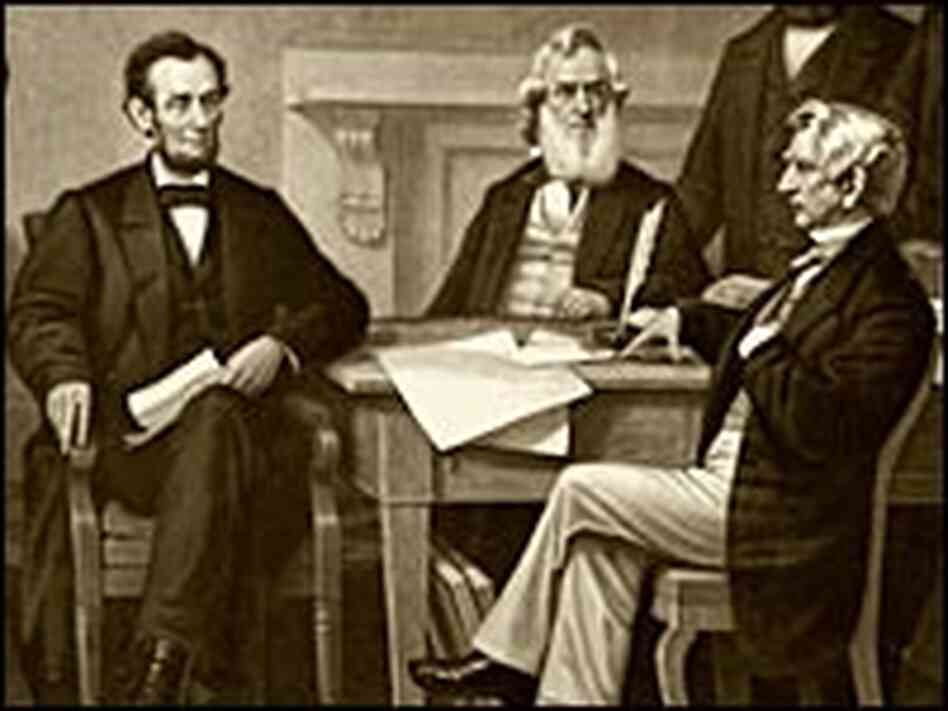Summary
Acclaimed historian Doris Kearns Goodwin illuminates Lincoln's political genius in this highly original work, as the one-term congressman and prairie lawyer rises from obscurity to prevail over three gifted rivals of national reputation to become president.
On May 18, 1860, William H. Seward, Salmon P. Chase, Edward Bates, and Abraham Lincoln waited in their hometowns for the results from the Republican National Convention in Chicago. When Lincoln emerged as the victor, his rivals were dismayed and angry.
Throughout the turbulent 1850s, each had energetically sought the presidency as the conflict over slavery was leading inexorably to secession and civil war. That Lincoln succeeded, Goodwin demonstrates, was the result of a character that had been forged by life experiences that raised him above his more privileged and accomplished rivals. He won because he possessed an extraordinary ability to put himself in the place of other men, to experience what they were feeling, to understand their motives and desires.
It was this capacity that enabled Lincoln as president to bring his disgruntled opponents together, create the most unusual cabinet in history, and marshal their talents to the task of preserving the Union and winning the war.
We view the long, horrifying struggle from the vantage of the White House as Lincoln copes with incompetent generals, hostile congressmen, and his raucous cabinet. He overcomes these obstacles by winning the respect of his former competitors, and in the case of Seward, finds a loyal and crucial friend to see him through.
This brilliant multiple biography is centered on Lincoln's mastery of men and how it shaped the most significant presidency in the nation's history.
(Provided by the author and organized by Litlovers)
Written in 2005
Publisher: Simon & Schuster
944 pp.
ISBN-13: 9780743270755
944 pp.
ISBN-13: 9780743270755
(provided by the Publisher Simon and Schuster)
1. Letters and diaries provided the greatest resource for Doris Kearns Goodwin in recreating the emotional lives of Lincoln and his cabinet. What will historians 200 years from now use to recreate our inner lives?
2. What are the leadership lessons that our new president can learn from a study of Lincoln’s emotional intelligence and political skills?
3. How was Abraham Lincoln able to win the Republican nomination in 1860 over his three chief rivals–Seward, Chase, and Bates–all of whom were more experienced, better educated and better known?
4. The night before his election as president, Lincoln made the decision to put each of these three rivals into his cabinet. What led him to this decision? What does it say about his temperament?
5. Lincoln has often been portrayed as suffering from depression all his life. Yet, Goodwin suggests that while he had a melancholy temperament, he developed constructive resources to combat his spells of sorrow. By the time he reached the presidency, Lincoln was the one who could sustain everyone else’s spirits. What were the means he used to shake off his sorrow?
6. How different would the course of the War been if Seward had won the nomination and the presidency?
7. President Barack Obama has said he would like to follow Lincoln’s example and surround himself with rivals and people who can question him and argue with him. What are the factors in our modern media and political culture that make it more difficult for a president to create and maintain a true team of rivals?
8. How did Lincoln stay connected with ordinary people during his presidency?
9. How and why did Seward’s attitude toward Lincoln shift?
10. What role did Lincoln’s sense of humor play? Where did he develop his storytelling ability? What are a few of the most memorable stories he liked to tell?
11. How did Lincoln’s thinking about slavery evolve over time? What led him to issue his Emancipation Proclamation? How would he answer complaints that the Proclamation did not free the slaves in the border states? How did Seward contribute to the timing of the Proclamation?
12. How would you characterize the complex relationship between Mary and Abraham Lincoln? When they first met they seemed well suited, yet their relationship deteriorated over time. To what extent did each partner contribute to their troubles; what role did external events play?
13. What role did Lincoln’s debates with Stephen Douglas play in his rise to prominence? How would you describe Lincoln’s attitudes toward the prospect of black equality as revealed in the debates? Why did Lincoln favor the idea of encouraging blacks to emigrate back to Africa?
14. Why did Lincoln put up with Chase for so long, knowing that he was maneuvering against him to win the nomination in 1864? What finally undid Chase? Why did Lincoln appoint him Chief Justice?
15. How would you describe the change in Stanton’s attitudes toward Lincoln from the time they first met as lawyers to the end? How did their opposing styles lead to positive results in the cabinet?
16. What is the picture that emerges of George McClellan? Why did Lincoln not fire him earlier? Compare and contrast McClellan’s style with that of General Grant.
17. Lincoln took great pride in the fact that 9 out of 10 soldiers voted for his reelection, even knowing that a vote for him meant lengthening the War since McClellan was promising a peace compromise. How did he develop such a rapport with the soldiers?
18. How did the women in the story affect the lives and careers of the men surrounding Lincoln–Frances Seward, Kate Chase, and Julia Bates?
19. How would you describe the complex relationship between Lincoln and Frederick Douglass?
20. How might reconstruction have been handled differently if Lincoln had not been killed?
The Movie: Lincoln
Official Trailer from Steven Spielberg: http://www.youtube.com/watch?v=VWpMt2-Z-fc



No comments:
Post a Comment